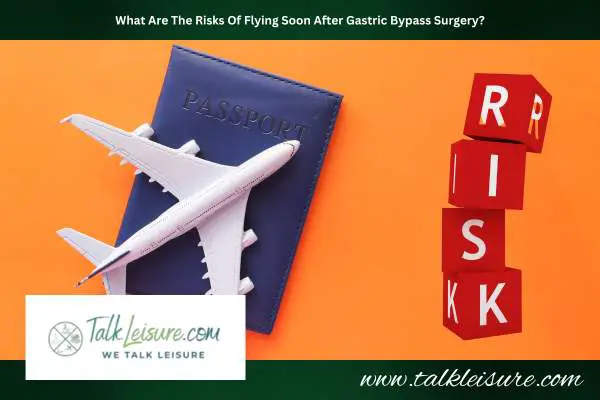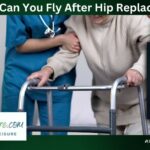Have you ever wondered if you can hop on a plane and travel to your dream destination after gastric bypass surgery?
It’s a common concern for those considering the procedure or recently undergoing it.
After all, traveling can be exciting, but it can also be stressful, especially when you’re anticipating the potential medical complications that might arise.
So, can you fly after gastric bypass surgery?
This blog post explores the answer to this question and some helpful tips for traveling after surgery.
Flying can bring excitement and adventure, but for those who have undergone gastric bypass surgery, it may raise certain concerns about their safety and well-being during the flight.
Most surgeons recommend waiting six to eight weeks before going on a flight after gastric bypass surgery.
However, some patients can fly as soon as 48 hours post-op, depending on their chosen procedure and flight duration.
Still, some precautions must be taken to ensure a safe and comfortable journey.
We will discuss the precautions for a safe flight after gastric bypass surgery.
What Is Gastric Bypass Surgery?

Gastric bypass surgery is a weight loss surgery that aims to reduce the size of the stomach and reroute the digestive tract to encourage weight loss.
Recovery from this surgery takes time, and taking it slow after the procedure is important.
Traveling after gastric bypass surgery requires some planning, but it’s possible to do so safely and comfortably.
Can You Fly After Gastric Bypass Surgery?

After gastric bypass surgery, many patients may wonder if it’s safe to travel by plane.
While it’s natural to want to return home as soon as possible after surgery, it’s important to let the body heal before flying.
Most surgeons recommend waiting at least six to eight weeks before air travel.
Still, some patients may be able to fly sooner, depending on their specific surgery and their surgeon’s recommendations.
When planning to travel after gastric bypass surgery, there are several things to remember to ensure a safe and comfortable trip.
While flying soon after surgery does have its risks, with careful planning and precautions, it is possible to travel safely and enjoyably.
What Are Tips For Flying After Gastric Bypass Surgery?

To minimize the risk of developing blood clots, the biggest risk associated with flying after bariatric surgery, patients should take measures such as booking a seat with extra legroom, performing leg exercises, and taking any prescribed blood thinners according to schedule.
By following these travel tips and seeking assistance when needed, patients can safely and comfortably fly after gastric bypass surgery.
Wearing Loose-Fitting Clothing
Wearing loose-fitting clothing is crucial for a safe and comfortable flight after gastric bypass surgery.
Tight clothing can restrict blood flow and increase the risk of developing blood clots, which is already a concern for those who have recently undergone surgery.
Loose clothing, on the other hand, allows for better circulation and prevents discomfort.
It’s important to wear comfortable clothing that doesn’t put pressure on the surgical site or cause discomfort during the flight.
When packing for the trip, it’s best to include loose clothing options in your luggage to ensure that the clothing you wear on the day of your flight is comfortable and appropriate.
Seek Assistance Or Inform The Airline Staff About Any Special Concerns Related To Post-Gastric Bypass Surgery.
When flying after gastric bypass surgery, it’s always best to be upfront with the airline staff.
Inform the staff about any special concerns related to your recent surgery or other medical conditions.
The airline can provide you with a wheelchair and assistive devices for mobility if you cannot walk for longer durations.
They can also make sure that you receive an aisle seat to easily get up, move around the cabin, and use the bathroom.
In addition, depending on your medical circumstances, the airline crew can arrange to have medical oxygen available during the flight.
It’s important to understand that airlines have various policies for post-surgery passengers.
Some airlines require pre-clearance from a doctor before allowing you to fly, while others might not.
Therefore, it’s essential to inform the airline staff, especially if you have a specific medical condition that worsens when traveling.
By doing so, you can get the necessary assistance and avoid any potential discomfort or harm during the flight.
The Relevance Of Travel Insurance Related To post-Gastric Bypass Surgery.
Traveling after gastric bypass surgery can be a concern for many patients.
While it is generally safe to fly after weight loss surgery, some precautions should be taken.
One important consideration is travel insurance.
It is crucial to ensure that your policy provides adequate medical coverage in case of any complications related to your surgery while traveling.
It is also recommended to wait at least six weeks before flying after surgery to allow for proper healing.
Seat selection with extra legroom
For those who have had gastric bypass surgery and are planning on flying, it is important to take certain precautions to avoid complications.
One of the best ways to make your flight more comfortable and reduce the risk of blood clots is to select a seat with extra legroom.
This will allow you to move your legs more freely and perform leg exercises during the flight.
Wearing compression stockings and taking frequent walk breaks are also recommended to improve blood circulation.
It is important to discuss your flight plans with your bariatric doctor before traveling to ensure you are taking the proper steps for a safe flight.
If you have experienced seizures or any other issues before then it best to relate about it to your doctor when making travel plans.
Patients with seizure are often advised to travel with a companion.
What Are The Precautions You Must Take For A Safe Flight After Gastric Bypass Surgery?

After undergoing bariatric surgery, patients may wonder if it’s safe to fly.
The risk of developing blood clots is significant, especially during a long flight.
It’s crucial to discuss travel plans with the surgeon to ensure proper precautions are taken, such as being maintained on anticoagulants. With some planning, flying after bariatric surgery is possible.
Stay Hydrated
Going on a flight after gastric bypass surgery is a concern for many patients, but it can still be a safe and comfortable experience with the right precautions.
Staying hydrated throughout the journey is important, as dehydration can lead to blood clots.
Therefore, drink plenty of water and other healthy drinks to keep yourself hydrated throughout the flight.
Take Walk Breaks
After undergoing gastric bypass surgery, taking the necessary precautions while traveling by air is important.
One of the most important things to remember is to take walking breaks during the flight.
Sitting in a confined space for a long period of time can increase the risk of developing blood clots, also known as deep vein thrombosis (DVT), which can be life-threatening.
To prevent this, booking a seat on the aisle or a seat with extra legroom is recommended.
This will allow the patient to perform leg exercises and get up and walk around the cabin every so often.
Pack Enough Medications And Supplements
Traveling after gastric bypass surgery can be challenging, but with proper preparation and precautions, it can be done safely.
One important step is to pack enough medications, supplements, and vitamins for the trip.
Bariatric patients must ensure they have enough of their prescribed medications and supplements to last through the entire trip.
It is also recommended to bring these with you on the plane in case of lost or delayed luggage.
Carrying a water bottle with you can help prevent dehydration, a common cause of rehospitalization after surgery.
Snacks and meals provided by airlines may not be suitable for bariatric patients, so packing pre-portioned snacks and sticking to a normal meal schedule can help maintain proper nutrition.
Packing enough medications and supplements is important for ensuring a safe and comfortable trip after gastric bypass surgery.
When taking supplements, it is best to ask a health care professional whether you can consume it after the gastric bypass surgery.
Also, ensure whether you can take supplements like creatin during the flight.
What Are The Risks Of Flying Soon After Gastric Bypass Surgery?

After undergoing gastric bypass surgery, many patients wonder about the risks of flying soon after the procedure.
Most surgeons recommend waiting six to eight weeks before flying after bariatric surgery.
This is because sitting in confined spaces for long periods of time during flight can increase the risk of blood clots, also known as deep vein thrombosis (DVT).
It is best not to fly until you get the green light from your surgeon.
Traveling after weight loss surgery requires some extra planning, but it’s possible to do it safely and comfortably.
Different surgeries have different healing timeframes.
For example, if you have done LASIK surgery, it is recommended to avoid fly for at least a week.
Final Thoughts
Flying after gastric bypass surgery can be a cause of concern for many patients.
Bariatric surgery facilities, such as Clinique Michel Gagner, recommend not flying for at least six weeks after the procedure due to the risk of blood clots.
Post-operative patients should also maintain excellent hydration and take anticoagulants as advised by their doctors.
Patients need to discuss their flight plans with their bariatric doctors ahead of time to avoid any complications.
To prevent blood clots, it is recommended to book a seat with extra legroom, perform leg exercises, and walk around the cabin every 1-2 hours.
Bariatric patients should also pack enough medication, supplements, and vitamins for the whole trip to avoid hassles with airport security.
Proper planning and following the doctor’s recommendations allow patients to travel safely even after undergoing bariatric surgery.
FAQS
Can I Carry Heavy Weight After Gastric Bypass Surgery?
Following gastric bypass surgery, patients are typically advised to avoid lifting heavy objects for several weeks to allow the body to heal properly.
Most surgeons recommend waiting six to eight weeks before engaging in any exercise or activities that involve heavy lifting.
Patients need to follow their surgeon’s instructions to avoid any complications during recovery.
How Long Does Gastric Bypass Surgery Take To Heal?
Gastric bypass surgery is a major surgical procedure that requires several weeks to heal properly.
The healing process may vary from person to person, depending on various factors such as age, weight, and overall health condition.
Generally, patients should expect to spend at least 2–3 days in the hospital after the procedure.
It may take a week or two for patients to resume regular activities and at least 6–8 weeks before engaging in strenuous physical activities.
Can I Eat Yogurt After Gastric Bypass Surgery?
The good news is that yogurt is generally safe after gastric bypass surgery.
In fact, it can be a healthy snack option that provides protein and other nutrients.
However, choosing low-fat and sugar-free options is important to avoid stretching the stomach pouch or causing discomfort.
It is also important to avoid yogurt with fruit pieces or chunks, as these can be difficult to digest.












